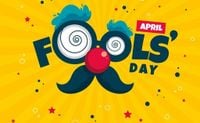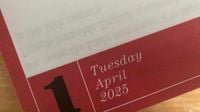April Fools’ Day, celebrated on April 1st each year, is a day filled with laughter, pranks, and light-hearted jokes. This global phenomenon has a rich history, with origins believed to trace back to France in the 1500s. Historians suggest that the holiday began when France transitioned from the Julian calendar to the Gregorian calendar, which moved the start of the new year from April 1 to January 1. Those who continued to celebrate the new year on April 1 were mocked as "April fools," marking the inception of this playful day.
According to the History Channel, the confusion surrounding the calendar change led to the creation of a tradition that would endure for centuries. The Library of Congress supports this assertion, detailing how the day became associated with pranks and hoaxes. By the 19th century, April Fools’ Day had firmly established itself in American culture, with various forms of celebration emerging across the globe.
Interestingly, another theory regarding the origins of April Fools’ Day connects it to the ancient Roman festival of Hilaria, celebrated on March 25. This festival honored the goddess Cybele and involved people dressing in disguises and mocking one another, a precursor to the modern-day pranks we enjoy today.
In Scotland, the tradition evolved into a two-day event, featuring "hunting the gowk" on the first day, where individuals were sent on phony errands, followed by "Tailie Day" on the second day, which involved pranks played on people's backsides. The first written records of April Fools’ Day in England date back to 1686, when biographer John Aubrey referred to April 1 as "Fooles holy day." By the 18th century, the tradition had spread throughout Britain, and it became widespread and popular by the 19th century.
April Fools’ Day is not just a historical curiosity; it has evolved into a day of creativity and fun, with individuals and brands alike taking part in the festivities. The rise of social media has amplified the reach of pranks, allowing brands to engage with consumers in innovative ways. For instance, in 2025, Protein Works launched a luxury, alcohol-free, protein-infused Champagne dubbed "Doms Proteinon," claiming it contained 20g of protein per glass. This product, marketed as "bubbles with benefits," capitalizes on the growing trend of health-conscious consumers.
Additionally, Majestic, a UK wine retailer, introduced "lickable labels" for its Definition by Majestic wine range, inviting consumers to taste the wine by licking a designated patch on the label. This imaginative approach to wine sampling sparked interest and showcased the playful spirit of April Fools’ Day.
Historically, pranks have varied widely in their execution and impact. One of the most memorable pranks occurred in 1957 when BBC producers convinced viewers that spaghetti was harvested from trees in Italy and Switzerland. At that time, spaghetti was not widely known in England, leading some viewers to inquire about purchasing their own spaghetti trees. Such audacious pranks have become legendary, demonstrating the lengths to which people will go for a good laugh.
In Oklahoma, the tradition of April Fools’ Day has also left its mark. Notable pranks include a 1994 announcement by Mike Steely that the University of Oklahoma Sooners would be recruiting an Amish tailback named Zechariah Leviticus, who supposedly built his strength by churning butter and building barns. This humorous fabrication played on the stereotypes of the Amish community and became a memorable moment in local lore.
Another infamous prank in Oklahoma history occurred on April 1, 1905, when pranksters in Enid convinced prominent citizens to attend a fictitious "Sucker's Convention." The joke began when a jailer led an attorney to believe that a dying soldier wanted to write his will. The prank escalated, ensnaring several local doctors and bankers, ultimately drawing the attention of a newspaper editor who documented the farce.
However, not all pranks have been received with laughter. In April 2020, as the COVID-19 pandemic began to unfold, a newspaper in Sapulpa published a story warning parents that their children would need to repeat the school year. The article, intended as an innocent April Fools’ joke, was met with backlash from anxious parents and educators, leading to an apology from the publication.
In more recent years, the Oklahoma County Sheriff's Office announced a new initiative featuring "tactical police cats" as a playful nod to April Fools’ Day. Staff Sgt. Bradley Wynn introduced the feline officers, Cujo and Bloodfang, in a Facebook video, humorously claiming that cats would replace K-9 officers. This light-hearted announcement showcased how even law enforcement can partake in the day's jovial spirit.
As April Fools’ Day approaches each year, individuals and organizations alike prepare for the opportunity to engage in playful banter and harmless pranks. The day serves as a reminder to embrace humor and creativity, allowing people to momentarily escape the seriousness of everyday life. In a world that can often feel overwhelming, April Fools’ Day offers a welcome break, encouraging laughter and camaraderie.
While the origins of April Fools’ Day may be shrouded in mystery, its continued celebration is a testament to humanity's love for humor and connection. Whether through simple pranks among friends or elaborate hoaxes by corporations, the spirit of April Fools’ Day remains intact, inviting everyone to participate in the joy of laughter.







